week 1 note
可爱英语星期一到星期天计划表带总结

可爱英语星期一到星期天计划表带总结Monday is the start of a new week, and it's important to have a plan in place to kick off the week on the right note. 可爱英语星期一是新的一周开始的日子,制定一个计划是非常重要的,让一周从良好的状态开始。
Having a schedule can help you stay organized and focused on your tasks for the day. 有一个计划可以帮助你保持有序,专注于每天的任务。
You can start by listing out your priorities for the day and allocating time blocks for each task. 你可以先列出当天的重点任务,并为每个任务分配一定的时间段。
Break down bigger tasks into smaller manageable ones to avoid feeling overwhelmed. 将大型任务分解成小而可管理的任务,避免感到不知所措。
Remember to include time for breaks and meals to maintain your energy levels throughout the day. 记得安排时间休息和用餐,保持一天的精力充沛。
On Tuesday, it's a good idea to review your progress from the day before and make any necessary adjustments to your plan. 星期二,检查前一天的进展并对计划进行必要的调整是一个不错的主意。
Reflect on what worked well and what could be improved upon to increase your productivity. 反思哪些做得好,有哪些可以改进来提高生产力。
高中英语100个单词小结

高中英语100个单词小结1.able:beabletodoNote:反义词unable表示不能,而diabled表示残疾的。
beabletodo 可以表示经过艰难困苦才能做到的事。
2.abroad用法:表示到(在)国外,是一个副词,前面不加介词。
Note:可以说fromabroad,表示从国外回来。
3.admit用法:表示承认的时候后面要加上动名词形式。
Note:表示允许进入的时候与介词to搭配。
4.advie用法:advieb.todo;adviedoingNote:后面的宾语从句要用虚拟语气。
即:adviethatb.(hould)do的形式。
5.afford用法:通常与动词不定式搭配使用。
Note:前面需要有beableto或can等词。
6.after用法:表示在时间、空间之后;beafter表示追寻。
Note:用在将来时的时候后面接一时间点,而in接一个时间段,如:after3o’clock;in3day.7.agree用法:与介词on,to,with及动词不定式搭配。
Note:agreeon表示达成一致;agreeto表示批准;agreewith表示同意某人说的话。
8.alive用法:表语性形容词,在句中只能作表语,不能作定语。
Note:可以作状语使用,表示活活地,如:buryb.alive.9.allow用法:allowdoing;allowb.todoNote:可以表示允许进入,如:Pleaeallowmein.10.among用法:用在三者或三者以上的群体中。
Note:还可以表示其中之一,如:Heiamongthebet.11.and用法:用于连接两个词、短语、句子或其他相同结构。
Note:与祈使句搭配时往往可以表示条件。
如:Wor khard,andyou’llucceedoonerorlater.12.another用法:表示又一个,泛指,相当于onemore的含义。
Note:bean某iouabout表示担心;bean某ioufor表示盼望得到。
英语作文开心的星期一

英语作文开心的星期一Monday is often seen as the toughest day of the week for many people.星期一通常被认为是一周中最艰难的一天。
It marks the end of the relaxing weekend and the start of a new work or school week.它标志着轻松的周末的结束,新的工作或学校周的开始。
For some, the thought of facing a long week ahead can be daunting and overwhelming.对于一些人来说,面对漫长的一周可能会让人感到恐惧和不知所措。
However, for some, Monday can actually be a day of excitement and new beginnings.然而,对于一些人来说,星期一实际上是充满激动和新开始的一天。
It all comes down to perspective and mindset when it comes to tackling Mondays with a positive attitude.当涉及以积极的态度应对星期一时,一切取决于观点和心态。
Instead of dreading the start of the week, one can choose to see Monday as a fresh start and a chance to set new goals.与其害怕一周的开始,一个人可以选择把星期一看作一个全新的开始和设定新目标的机会。
By approaching Mondays with a sense of optimism, one can set the tone for a successful and productive week ahead.通过乐观的态度来面对星期一,一个人可以为成功和高效的下一周打下基调。
四年级英语星期1至星期天的作文的公式

探索星期的神秘面纱:四年级英语视角In the wonderful world of weekdays, each day holds its own charm and uniqueness. Let's embark on a journey to uncover the mysteries of the weekdays through the eyes of a fourth-grade English student.Monday, the start of a new week, is like a fresh canvas waiting to be painted. It's a day filled with hope and excitement as students return to school with new books anda renewed sense of purpose. The atmosphere is buzzing with energy, as if everyone is ready to take on the challengesof the week.Tuesday is a day of transition, moving smoothly fromthe excitement of Monday to the midweek hump. It's a day where students start to settle into the routine of the week, finding their groove and getting into the flow of learning. Wednesday is the midpoint of the week, a day that often brings a sense of accomplishment. By this point, students have adjusted to the week's pace and start to feel more confident in their abilities. It's also a day to reflect on what has been learned and prepare for the challenges ahead.Thursday brings a renewed sense of energy as the week nears its end. Students are looking forward to the weekend and are eager to finish the last few days of the week on a high note. It's a day filled with hope and anticipation.Friday, the penultimate day of the week, is like a breath of fresh air. The atmosphere is lighter and more relaxed as students count down the hours until the weekend. It's a day to celebrate the accomplishments of the week and look forward to the fun and adventures of the coming days. Saturday is a day of freedom and relaxation. It's a time to unwind, recharge, and enjoy the fruits of a hard-earned week. Whether it's spending time with family, playing outside, or simply catching up on some rest, Saturday is a day to cherish.And finally, Sunday, the grand finale of the week. It's a day of reflection and preparation, a time to look back on the week's highlights and lessons learned. It's also a day to get ready for the coming week, setting goals and making plans for the days ahead.Through the eyes of a fourth-grade English student, we see that each day of the week holds its own unique charmand value. From the fresh start of Monday to the relaxing freedom of Sunday, each day is a new adventure waiting tobe explored. And as the week comes to an end, we can all take a moment to appreciate the beauty and wonders of the weekdays that have passed and look forward to the exciting days ahead.**星期的神秘面纱:四年级学生的视角**在丰富多彩的星期世界中,每一天都拥有其独特的魅力和特点。
一周任务清单英语作文
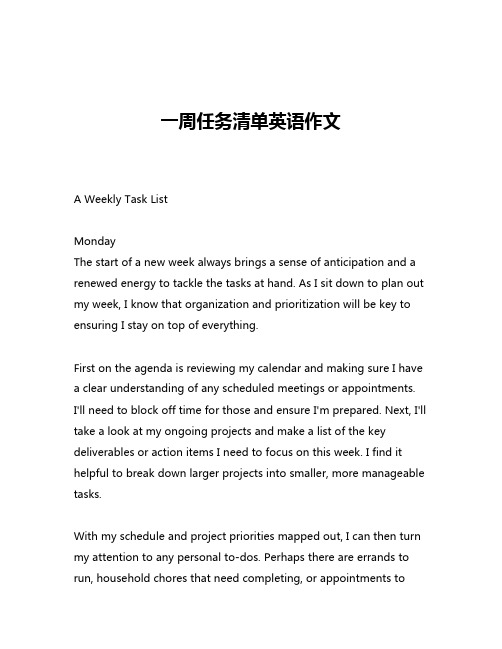
一周任务清单英语作文A Weekly Task ListMondayThe start of a new week always brings a sense of anticipation and a renewed energy to tackle the tasks at hand. As I sit down to plan out my week, I know that organization and prioritization will be key to ensuring I stay on top of everything.First on the agenda is reviewing my calendar and making sure I have a clear understanding of any scheduled meetings or appointments. I'll need to block off time for those and ensure I'm prepared. Next, I'll take a look at my ongoing projects and make a list of the key deliverables or action items I need to focus on this week. I find it helpful to break down larger projects into smaller, more manageable tasks.With my schedule and project priorities mapped out, I can then turn my attention to any personal to-dos. Perhaps there are errands to run, household chores that need completing, or appointments tomake. I'll weave those in where I can, ensuring I'm using my time as efficiently as possible.Finally, I'll review my list and identify any areas that may require additional focus or coordination with colleagues. I'm a big believer in over-communicating, so I'll make a note to check in with relevant team members to align on expectations and deadlines.TuesdayAs I dive into my Tuesday, I'm feeling organized and ready to tackle the day. I start by reviewing my to-do list from yesterday and making any necessary adjustments. A few new items have popped up, so I'll need to reprioritize and find the best way to fit them in.One of the key things on my plate today is preparing for an important client meeting later this week. I'll need to review the latest project status, prepare a presentation, and ensure I have a clear understanding of the client's goals and expectations. I block off a couple of focused work sessions to work on this, minimizing distractions as much as possible.In between those work blocks, I'll weave in some of my personal to-dos. Perhaps I'll take a break to run an errand or two, grab a healthy lunch, and check in on any household tasks that need attention. Maintaining a good work-life balance is crucial, so I'm intentionalabout carving out time for both.As the day winds down, I'll review my progress and make any necessary adjustments to my Wednesday plan. Keeping a close eye on my tasks and deadlines is essential to staying on top of everything.WednesdayHump day is here, and I'm feeling energized and ready to tackle the second half of the week. I start my day by reviewing my to-do list and calendar, ensuring I have a clear understanding of what's ahead.One of the big items on my plate today is a team meeting. I'll need to prepare an update on the project I'm leading, as well as be ready to contribute to discussions on other initiatives. I set aside time to review my notes, gather any relevant materials, and mentally prepare for the conversation.In between work tasks, I try to take regular breaks to stretch, grab a healthy snack, and clear my mind. I find that these brief respites help me stay focused and productive throughout the day. I also make sure to check in with my colleagues, both to stay aligned on priorities and to maintain a positive team dynamic.As the afternoon rolls around, I tackle some of my personal to-dos,such as scheduling a doctor's appointment or responding to personal emails. I find that breaking up my day in this way helps me stay balanced and energized.Before I wrap up for the day, I review my progress and make any necessary adjustments to my Thursday plan. Staying adaptable and flexible is key, as new tasks and priorities can often arise unexpectedly.ThursdayThursday is here, and I'm feeling focused and ready to tackle the day.I start by reviewing my to-do list and calendar, making any necessary adjustments based on the previous day's progress.One of the key items on my agenda today is a client call. I've spent time preparing for this, and I'm confident I have a clear understanding of the agenda and the client's needs. I block off a dedicated time slot for the call, ensuring I'm able to give it my full attention without any distractions.In between work tasks, I make sure to take regular breaks to stretch, grab a healthy snack, and clear my mind. I find that these brief respites help me stay focused and productive throughout the day. I also make a point to check in with my colleagues, both to stay aligned on priorities and to maintain a positive team dynamic.As the afternoon rolls around, I tackle some of my personal to-dos, such as scheduling a haircut or responding to personal emails. I find that breaking up my day in this way helps me stay balanced and energized.Before I wrap up for the day, I review my progress and make any necessary adjustments to my Friday plan. Staying adaptable and flexible is key, as new tasks and priorities can often arise unexpectedly.FridayTGIF! As I start my Friday, I'm feeling a mix of relief and accomplishment. I've made it through the bulk of my weekly tasks, and now it's time to wrap things up and prepare for the weekend.I begin by reviewing my to-do list and calendar, making sure I haven't missed anything. I also take a moment to reflect on the progress I've made this week and identify any areas where I may need to follow up or carry tasks over to the next week.One of the key items on my agenda today is a team check-in. I'll need to provide an update on the project I'm leading, as well as gather feedback and input from my colleagues. I set aside time to prepare for this meeting, ensuring I have all the necessaryinformation and materials at hand.In between work tasks, I make sure to take regular breaks to stretch, grab a healthy lunch, and decompress. I find that these brief respites help me stay focused and productive throughout the day. I also make a point to check in with my colleagues, both to stay aligned on priorities and to maintain a positive team dynamic.As the afternoon rolls around, I tackle any remaining personal to-dos, such as scheduling a weekend activity or responding to personal emails. I find that breaking up my day in this way helps me stay balanced and energized.Before I wrap up for the week, I review my progress and make any necessary adjustments to my plan for the following week. I also take a moment to celebrate my accomplishments and feel a sense of satisfaction in a job well done.SaturdayAh, the weekend – a time to recharge and enjoy some well-deserved rest and relaxation. As I start my Saturday, I take a moment to review my weekly task list and reflect on what I was able to accomplish.One of the first things I do is tackle any outstanding personal tasksor errands. Perhaps I need to run some grocery shopping, do a loadof laundry, or schedule a dentist appointment. I find that addressing these types of to-dos early in the weekend helps me feel more organized and prepared for the week ahead.With my personal tasks out of the way, I then turn my attention to some leisure activities. Maybe I'll go for a hike, read a book, or catch up on a TV show I've been meaning to watch. I find that taking the time to unwind and recharge is essential for maintaining a healthy work-life balance.Throughout the day, I also make sure to check in on any work-related tasks that may require my attention. I'll review my email, respond to any urgent messages, and make a note of any action items I'll need to address on Monday. But I'm intentional about not letting work dominate my weekend – it's important to maintain that boundary and prioritize my personal time.As the day winds down, I reflect on the week that's passed and start to think about the week ahead. I make a mental note of any priorities or tasks I'll need to focus on, and I feel a sense of excitement and anticipation for the new week to come.SundayAh, the last day of the weekend – a time to recharge, reflect, and prepare for the week ahead. As I start my Sunday, I take a moment toreview my weekly task list and make any necessary adjustments.One of the first things I do is tackle any remaining personal tasks or errands. Perhaps I need to meal prep for the week, do some light cleaning around the house, or schedule a doctor's appointment. I find that addressing these types of to-dos early in the day helps me feel more organized and prepared for the week ahead.With my personal tasks out of the way, I then turn my attention to some leisure activities. Maybe I'll go for a walk, read a book, or spend some time practicing a hobby. I find that taking the time to unwind and recharge is essential for maintaining a healthy work-life balance.Throughout the day, I also make sure to review my work-related tasks and priorities for the upcoming week. I'll review my calendar, make a list of any key deliverables or meetings, and identify any areas where I may need to coordinate with colleagues. I'm intentional about not letting work dominate my weekend, but I do want to make sure I'm prepared and ready to hit the ground running on Monday.As the day winds down, I reflect on the week that's passed and the week ahead. I make a mental note of any areas where I may need to adjust my approach or focus, and I feel a sense of excitement andanticipation for the new week to come. I know that with a solid plan in place, I'll be able to tackle whatever challenges or opportunities arise.。
英文学习计划手帐模板
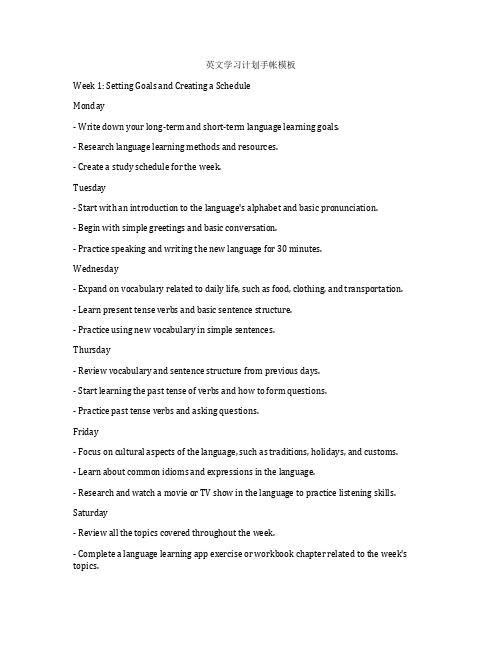
英文学习计划手帐模板Week 1: Setting Goals and Creating a ScheduleMonday- Write down your long-term and short-term language learning goals.- Research language learning methods and resources.- Create a study schedule for the week.Tuesday- Start with an introduction to the language's alphabet and basic pronunciation.- Begin with simple greetings and basic conversation.- Practice speaking and writing the new language for 30 minutes.Wednesday- Expand on vocabulary related to daily life, such as food, clothing, and transportation. - Learn present tense verbs and basic sentence structure.- Practice using new vocabulary in simple sentences.Thursday- Review vocabulary and sentence structure from previous days.- Start learning the past tense of verbs and how to form questions.- Practice past tense verbs and asking questions.Friday- Focus on cultural aspects of the language, such as traditions, holidays, and customs. - Learn about common idioms and expressions in the language.- Research and watch a movie or TV show in the language to practice listening skills. Saturday- Review all the topics covered throughout the week.- Complete a language learning app exercise or workbook chapter related to the week's topics.- Schedule a language exchange with a native speaker or practice with a language partner. Sunday- Reflect on the progress made during the week.- Note down any challenges faced and how to overcome them.- Adjust the study schedule for the following week.Week 2: Grammar and Vocabulary ExpansionMonday- Review the study schedule from the previous week.- Continue with advanced greetings and conversation topics.- Practice introducing yourself and having simple conversations.Tuesday- Expand vocabulary related to work, school, and hobbies.- Learn about different verb tenses and when to use them.- Practice forming sentences in different verb tenses.Wednesday- Learn about adjective and adverb usage in the language.- Practice describing people, places, and things using adjectives and adverbs.- Study common phrases and expressions used in everyday conversations.Thursday- Review vocabulary and grammar topics from the week.- Continue to practice using different verb tenses and forming more complex sentences. - Watch a language tutorial or educational video to reinforce learning.Friday- Explore more about the culture, history, and literature of the language.- Read a short story or article in the language and try to understand the main points.- Research and listen to a song or podcast in the language to improve listening skills.Saturday- Review all the topics covered throughout the week.- Complete a language learning app exercise or workbook chapter related to the week's topics.- Schedule a language exchange with a native speaker or practice with a language partner. Sunday- Reflect on the progress made during the week.- Note down any challenges faced and how to overcome them.- Adjust the study schedule for the following week.Week 3: Listening and Speaking PracticeMonday- Review the study schedule from the previous week.- Focus on listening comprehension and understanding native speakers.- Practice listening to audio clips and transcribing the content in the language. Tuesday- Start with pronunciation practice and mastering difficult sounds.- Record yourself speaking in the language and listen for pronunciation and intonation. Wednesday- Watch a movie or TV show in the language with subtitles.- Practice repeating and imitating the dialogue to improve speaking and listening skills. Thursday- Listen to a podcast or radio show in the language.- Engage in a conversation with a native speaker or language partner to practice speaking and listening.Friday- Explore different dialects and regional accents of the language.- Listen to recordings of various speakers to understand different accents and speech patterns.Saturday- Review all the topics covered throughout the week.- Complete a language learning app exercise or workbook chapter related to the week's topics.- Schedule a language exchange with a native speaker or practice with a language partner. Sunday- Reflect on the progress made during the week.- Note down any challenges faced and how to overcome them.- Adjust the study schedule for the following week.Week 4: Writing and Reading ComprehensionMonday- Review the study schedule from the previous week.- Start with basic writing exercises and forming sentences in the language.- Practice writing a short paragraph about yourself or a topic of interest.Tuesday- Focus on reading comprehension and understanding written material in the language. - Read a short article or story and summarize the main points in the language. Wednesday- Expand vocabulary related to technology, science, and current events.- Learn about formal and informal writing styles and when to use them.- Practice writing formal and informal emails or letters in the language.Thursday- Review vocabulary and writing topics from the week.- Continue to practice writing and reading comprehension exercises.- Research and read a book or novel in the language to improve reading skills.Friday- Explore creative writing in the language, such as poetry or short stories.- Write a creative piece and share it with a language partner for feedback.Saturday- Review all the topics covered throughout the week.- Complete a language learning app exercise or workbook chapter related to the week's topics.- Schedule a language exchange with a native speaker or practice with a language partner. Sunday- Reflect on the progress made during the week.- Note down any challenges faced and how to overcome them.- Adjust the study schedule for the following week.Week 5: Review and ApplicationMonday- Review the study schedule from the previous week.- Revise all the topics covered in the past month and identify areas for improvement. Tuesday- Practice scenario-based conversations and role-playing exercises.- Engage in a conversation with a native speaker or language partner on different topics. Wednesday- Review grammar rules and practice applying them in different contexts.- Complete exercises and quizzes related to grammar and vocabulary on language learning apps or websites.Thursday- Work on a language learning project or presentation to showcase the progress made.- Prepare a short speech or presentation in the language and practice delivering it. Friday- Review and improve on any weak areas identified during the week.- Practice speaking, listening, reading, and writing skills in different scenarios.Saturday- Review all the topics covered throughout the week and the past month.- Complete a language learning app exercise or workbook chapter related to the week's topics.- Schedule a language exchange with a native speaker or practice with a language partner. Sunday- Reflect on the progress made during the week and the past month.- Note down any challenges faced and how to overcome them.- Set new language learning goals for the upcoming month and adjust the study schedule accordingly.*Note: This study plan is a general guideline and can be customized based on individual learning preferences and goals. It is important to remain consistent, practice regularly, and seek feedback from native speakers or experienced language tutors to improve language skills.。
myweek ppt课件

01
02
03
04
提高工作效率
公道安排时间,能够更高效地 完成任务,减少加班和延误。
减轻压力
有效的时间管理可以减轻压力 ,避免任务堆积和紧急情况带
来的紧张情绪。
平衡工作与生活
公道安排时间,能够更好地平 衡工作与家庭、个人生活的关
系,提高生活质量。
提升个人成绩感
通过有效的时间管理,能够更 好地实现个人目标和梦想,提
制定下周的时间安排, 确保任务能够按时完成 。
团队协作
计划下周与团队成员的 沟通和协作,提高团队 整体效率。
高个人成绩感。
时间管理方法
制定计划
制定每日、每周、每月的计划 ,明确目标和任务。
优先级排序
根据任务的紧急程度和重要性 ,进行优先级排序,先完成重 要且紧急的任务。
避免拖延
及时开始并完成任务,避免拖 延导致时间不够用和焦虑。
学会说“不”
避免接受过多的任务和责任, 学会拒绝不必要的要求和邀请
。
时间管理工具
根据任务的变化和实际情况,适时调整任务的优 先级,以确保任务的顺利完成。
05
自我提升
学习新技能
学习新技能
通过参加培训课程、在线学习平台或自学,学习新的技能和知识 ,提高自己的专业能力和竞争力。
掌握新工具
学习使用新的工具和软件,提高工作效率和创造力。
探索新领域
尝试新的领域和兴趣爱好,开辟视野,丰富自己的生活经验。
、紧急程度等。
分解方法
采取不同的分解方法,如列表、 流程图、思维导图等,以便更好
地显现任务的分解情况。
任务优先级
优先级排序
根据任务的紧急程度、重要性和优先级等因素, 对任务进行排序,确定任务的优先级。
English notebook
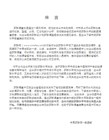
胡主席表示,为了继续其领导地位,共产党必须要适应不断变化的国情与瞬息万变的世界。
他表示,如果不能保持经济的持续发展已经社会稳定,那么这20多年,创建廉洁政府。他提出,若身为政府官员的党员们出现腐败行为的话,将失去人民群众的信任。
President Hu said the Communist Party, to continue its rule, must adapt to(适应...) a changing nation and a changing world.
He said that without continued fast economic development and social order(秩序), the gains of the past 20 years will be lost.
China's Communist Party is celebrating its 90th anniversary. A small group of intellectuals(n.知识分子) established the party in July of 1921 in Shanghai. In 1949, after a long civil(公民的,市民的) war, the Communist Party defeated the Nationalists and took power under Mao Zedong.
People use the expression fireworks throughout the year. But if you live in the United States and want to see real fireworks, the best time of the year is about now. The Fourth of July is Independence Day in the United States. Americans traditionally celebrate their nation's freedom with giant public parties and fireworks at night.
myweek英语作文带翻译
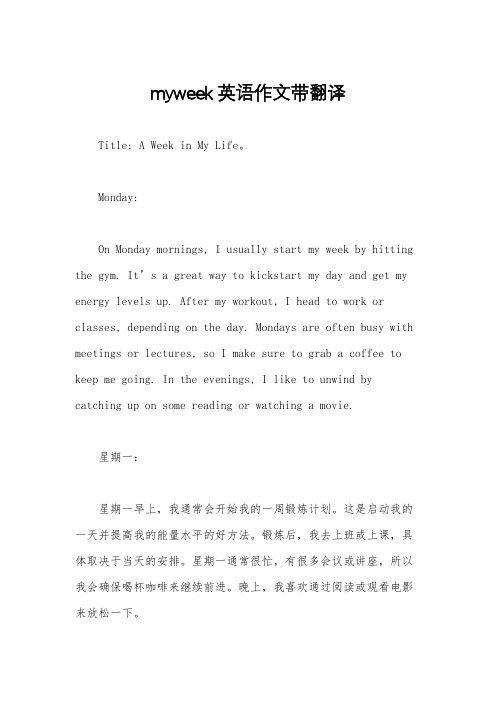
myweek英语作文带翻译Title: A Week in My Life。
Monday:On Monday mornings, I usually start my week by hitting the gym. It’s a great way to kickstart my day and get my energy levels up. After my workout, I head to work or classes, depending on the day. Mondays are often busy with meetings or lectures, so I make sure to grab a coffee to keep me going. In the evenings, I like to unwind by catching up on some reading or watching a movie.星期一:星期一早上,我通常会开始我的一周锻炼计划。
这是启动我的一天并提高我的能量水平的好方法。
锻炼后,我去上班或上课,具体取决于当天的安排。
星期一通常很忙,有很多会议或讲座,所以我会确保喝杯咖啡来继续前进。
晚上,我喜欢通过阅读或观看电影来放松一下。
Tuesday:Tuesdays are my busiest days. I have back-to-back meetings or classes throughout the day, with barely any time for breaks. It can be exhausting, but I try to stay focused and productive. In the evening, I usually treat myself to a nice dinner or order takeout to reward myself for getting through the day.星期二:星期二是我最忙碌的一天。
week 1 定冠词
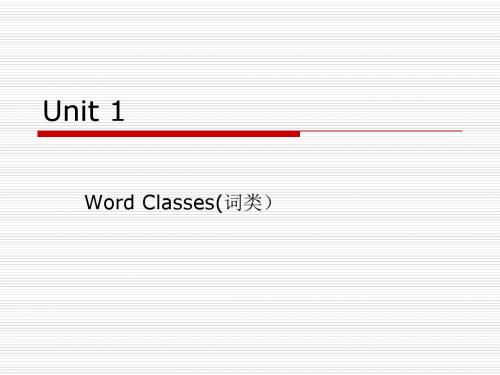
零冠词的用法 :Pg 26-29 1) 一些国名,人名前通常不用定冠词: England,Mary; 2)泛指的复数名词,表示一类人或事物时,可不用定冠词; They are teachers. 他们是教师。 3)抽象名词,抽象名词表示一般概念时,通常不加冠词; Failure is the mother of success. 失败乃成功之母。 Man cannot live without water. 人离开水就无法生存。 5)在季节、月份、节日、 假日、日期、星期等表示时间的名词之前, 不加冠词; We go to school from Monday to Friday. 我们从星期一到星期 五都上课。 6)在三餐、球类运动和娱乐运动的名称前,不加冠词 如: have breakfast,play chess 8)当by 与火车等交通工具连用,表示一种方式时,中间无冠词; by bus,by train; 9) 在固定词组中 first of all,from first to last
11)民族,历史文化遗迹,河流,岛屿,沙漠和山川, 地区及复数名词前 The Middle East, the Far East,the Chinese 12)报刊杂志名 The Times, the Washiongton Post 13) 用在惯用语中: in the day, in the morning (afternoon,evening), in the end, by the way
Unit 1
Word Classes(词类)
词类word class
主要词类 major word class
次要词类minor word class
2016秋季小学英语五年级上册Unit2-My-week.讲解及练习

Unit2 My week一.重点单词(.星期一到星期天首字母要大写,星期的第一天是星期天)。
Monday(Mon.) 星期一Tuesday(Tue.) 星期二Wednesday(Wed.) 星期三Thursday(Thu.) 星期四Friday(Fri.) 星期五Saturday(Sat.) 星期六Sunday (Sun.) 星期日week一周weekend周末weekday工作日day天注意:(合成词)day:Monday;Tuesday;Wednesday;Thursday;Friday;Saturday;Sunday2. 科目:语文Chinese 数学maths 英语English烹饪课cooking class 科学science 音乐music美术art 计算机课computer class 足球课football class 体育课PE class3. 短语:do homework 做作业watch TV 看电视read books读书wash my clothes 洗我的衣服play football踢足球play ping-pong打乒乓球play basketball打篮球play sports做运动play the pipa 弹琵琶draw pictures 画画clean the room 打扫房间do housework 做家务listen to music 听音乐on在…..时候on the weekend 在周末(at) on weekends在周末二.语音:字母组合“ee, ea”在单词中的的发音:[ i: ]tea 茶eat吃read 读书repeat重复feed 喂养beef牛肉feet双脚meet遇见see看见注:1、ee组合绝大部分发长音[ i: ],只有少部分发短音[ i ],如:coffee 咖啡2、ea字母组合除了发[ i: ],还有可能发[ e ]等发音,如:bread 面包,或者发[ ei ],如:great 好极了三.重点句型:1.询问星期和日期及回答。
英文note的汉语是什么意思

英文note的汉语是什么意思英文单词note的汉语意思英 [nəʊt] 美 [noʊt]名词笔记; 音符; 便笺; 钞票及物动词注意; 记录; 指出; 对…加注释相关词组1. compare notes : 交换意见;2. of note : 著名的;3. take note of : 注意到;4. strike the right note : 说得恰当;英文单词note的词典解释1. 强调指出;特别提到If you note something, you mention it in order to draw people's attention to it.e.g. The report notes that export and import volumes picked up in leading economies...报告特别指出经济大国的.进出口量攀升。
e.g. The yearbook also noted a sharp drop in reported cases of sexually transmitted disease.年鉴同时指出,性传播疾病报告病例数显著下降。
2. 记录;记下When you note something, you write it down as a record of what has happened.e.g. 'He has had his tonsils out and has been ill, too,' she noted in her diary...“他切除了扁桃体,一直病着,”她在日记里写道。
e.g. One policeman was clearly visible noting the number plates of passing cars...能清楚地看到一名警察记下了经过车辆的车牌号。
3. see also: noted;promissory note;sleeve note4. 交换意见;交流情况If you compare notes with someone on a particular subject, you talk to them and find out whether their opinion, information, or experience is the same as yours.e.g. The women were busily comparing notes on the queen's outfit...女人们忙着交换对女王衣着的看法。
用英语写请假条
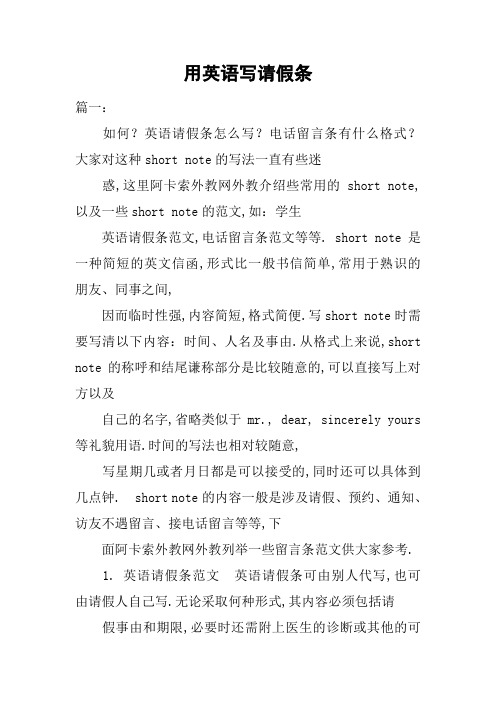
用英语写请假条篇一:如何?英语请假条怎么写?电话留言条有什么格式?大家对这种short note的写法一直有些迷惑,这里阿卡索外教网外教介绍些常用的short note,以及一些short note的范文,如:学生英语请假条范文,电话留言条范文等等. short note是一种简短的英文信函,形式比一般书信简单,常用于熟识的朋友、同事之间,因而临时性强,内容简短,格式简便.写short note时需要写清以下内容:时间、人名及事由.从格式上来说,short note的称呼和结尾谦称部分是比较随意的,可以直接写上对方以及自己的名字,省略类似于mr., dear, sincerely yours 等礼貌用语.时间的写法也相对较随意,写星期几或者月日都是可以接受的,同时还可以具体到几点钟. short note的内容一般是涉及请假、预约、通知、访友不遇留言、接电话留言等等,下面阿卡索外教网外教列举一些留言条范文供大家参考.1. 英语请假条范文英语请假条可由别人代写,也可由请假人自己写.无论采取何种形式,其内容必须包括请假事由和期限,必要时还需附上医生的诊断或其他的可以证明请假事由的书面材料. 学生英语请假条范文:july 20, 20XXdear mr. black: i am terribly sorry to informyou that i am unable to go to school today owing to a severe headache. i enclosea certificatefrom the doctor who is attending on me,as she fears it will be two days before i shall be able to resumemy study. could youkindly excuse my absence on monday and tuesday? thanks. peter2. 约会条约会条主要用于邀朋友相聚等,内容必须包含约会的事由,如果已经确定了时间和地点,则应将具体时间和地点写在short note上.英语约会条范文:aug 8, 20XX andy, michael3. 电话留言条电话留言(telephone message)便条是在给别人打来电话时,该人不在场,你替他或她接了电话后留给该人的字条.写这种便条时,首先要告诉对方谁打来的电话,再把电话内容转告清楚.电话留言条范文 wednesday, january 09, 20XX ms wang, a friend of yours, zhang peng, made a long distance call from shanghai this morningwhile you went out. he asked you to book an airticket for hebei at 2: 30 a.m., february8, and make a reservationfor hotel room tonight.i am sorry that i can’t pass onthe message to you in your presence, because i was ordered to do something urgent.zhao yang篇二:英语请假条怎么写?英语请假条写作模板每周免费英语公开课,欢迎你的到来注册安格即送3次课程试听英语请假条怎么写?英语请假条写作模板安格英语导读:英语请假条怎么写?职场上,难免会遇到需要请假的时候,这个时候就需要写请假邮件了。
常见英文公文

一便函或备忘录(Informal Letters or Memos)二便笺(Short Note)三通知(Announcement)四事务信函(Business Letters)五留学申请信(Application for Admittance)六奖学金申请信(Applications for Scholarships)七求职信(Letters of Applying for a Job)九投诉信(Letters of Complaint)十社交书信概述一便函或备忘录(Informal Letters or Memos)便函和备忘录通常用于公司内部传递信息,将实情、信息、观察资料等进行传阅。
便函和备忘录包括如下固定格式:Date:(日期,如September 12, 2001)To:(收文人,如All Faculty)From:(发文人,如Jim B. Hardemann)Subject:(事由,如Faculty Meeting)写作特点:1在date,to,from,subject字样后填上相应的内容。
2在上述字样下面空两行写正文。
3不用称呼和结尾礼词。
发文人的姓名首字母写在与正文末行空一行的地方。
【例一】TO: Henry Smith, Sales ManagerFROM: Jack Wong, Personnel ManagerDATE: May 4, 2000SUBJECT: Applicants for Sales PostAttached are the resumes and certificates of four applicants who have applied for your department position.Please evaluate these applicants and then recommend people you want to interview to me.As soon as I have the names, I will make arrangement for the interviews.J.W.【例二】To: Ted FengDate: Oct. 1stFrom: Paul AnderssonTime: 17:42Topic: Delay of arrivalPaul called for you, just after you had left work. He missed the flight due to the bad weather. He will not arrive until 5 p m today on flight No. JL608. You are requested to meet him at the airport and drive him to Holiday Inn. This means you needn t wait for him at lunch time tomorrow. To make up he wants to invite you for dinner.Nancy二便笺(Short Note)便笺是一种简短信函。
week 1学术英语听说

Introduction How do you learn this course?
• In class Focus on Listening and speaking skills Listening: • Note-taking skills • Outline and summary • check and test Speaking: • Presentation skills • Pair/Group Discussion
2. 《学术英语听说》unit 1
① 听讲座“Understanding spoken English” (clip1-3)和 “Differences between lectures in the UK and in China”(clip4-5) ,记笔记。(上课交纸质版) ② 根据笔记写summary.(批改网;作文号为: 488838/488840;截止日期:10/06)
• Do you think it is difficult to understand spoken English? What are some the reasons that have caused listening problems to you? Could you list 3-5 reasons? • Compare your list with your partner and get ready to share your reasons with the class.
Introduction How do you learn this course?
• After Class Study Preparation – Speaking: • Pair/Group Discussion in Academic Scenarios • Research Presentation (Pair Work) – Research Topic (Problem) – Research Approach (survey/experiment) – Research Findings(Solution) – Presentation (10-15mins)
笔记本的英文怎么说

笔记本的英文怎么说笔记本,在日常生活中指的是用来记录各类事情的小册子。
那么你知道笔记本用英文怎么说吗?下面店铺为大家带来笔记本的英文说法,欢迎大家学习。
笔记本的英文说法1:notebook英 [ˈnəutbuk] 美 [ˈnotˌbʊk]笔记本的英文说法2:pocketbook英 [ˈpɔkɪtˌbʊk] 美 [ˈpɑkɪtˌbʊk]笔记本相关英文表达:随身携带笔记本Carry a Notebook everywhere笔记本英文说法例句:1. Tamsin materialized at her side, notebook at the ready.塔姆辛从她身旁冒了出来,且备好了笔记本。
2. He took my name and address, scribbling it down in his notebook.他要了我的姓名和地址,匆匆写在他的笔记本上。
3. Prue entered the passage in her notebook, then read it aloud again.普吕把那一段写在她的笔记本上,然后又大声念了一遍。
4. The device plugs into one of the laptop's USB ports.这个设备可以插入到笔记本电脑的一个通用串行总线接口。
5. He extracted a small notebook from his hip pocket.他从屁股兜里摸出一个小笔记本。
6. Each week she meticulously entered in her notebooks all sums received.每个星期她都细心地在笔记本上记下所有收到的款项。
7. "It's from a notebook," the sheriff said, "And there's writing on it."“这是在一个笔记本里找到的,”法官道,“上面还有文字。
高中英语合成词

高中英语合成词有很多,以下是一些常见的例子:
1.合成名词:
o classmate(class + mate)同学
o homework(home + work)家庭作业
o notebook(note + book)笔记本
o weekend(week + end)周末
2.合成形容词:
o friendly(friend + ly)友好的
o beautiful(beauty + ful)美丽的
o peaceful(peace + ful)和平的
o successful(success + ful)成功的
3.合成动词:
o reboot(re + boot)重新启动
o download(down + load)下载
o upload(up + load)上传
o self-destruct(self + destruct)自我毁灭
4.合成副词:
o overhead(over + head)在头顶上
o underground(under + ground)在地下
o doorway(door + way)门口
o doorway(door + way)门口
5.合成代词:
o anything(any + thing)任何事物
o everyone(every + one)每个人
o nothing(no + thing)没有任何事物
o someone(some + one)某人
6.合成介词:
o into(in + to)进入…之内,到…里面去;变成…的样子,进入…的状态。
o upon(up + on)在…之上,向…之上;突然产生[发生]在…之上。
英语一周学习计划怎么画

英语一周学习计划怎么画Day 1: MondayMorning: 9:00am - 12:00pm- Review vocabulary and grammar from last week's lessons- Complete a listening comprehension exercise- Read a short story and answer comprehension questionsAfternoon: 1:00pm - 3:00pm- Watch a TED talk or other English-speaking video- Take notes on key points and new vocabulary- Practice summarizing the main ideas in EnglishEvening: 7:00pm - 9:00pm- Join a language exchange meetup or online chat- Engage in conversation with native English speakers- Take note of any new words or phrases and practice using them in conversation Day 2: TuesdayMorning: 9:00am - 12:00pm- Work on exercises from an English grammar workbook- Focus on a specific grammar point (e.g. past continuous tense)- Practice writing sentences and paragraphs using the grammar point Afternoon: 1:00pm - 3:00pm- Read a chapter from an English novel or non-fiction book- Highlight new vocabulary and look up definitions- Write a short summary of the chapter in EnglishEvening: 7:00pm - 9:00pm- Listen to an English podcast or audio book- Take notes on the content and vocabulary- Practice repeating or summarizing key points in EnglishDay 3: WednesdayMorning: 9:00am - 12:00pm- Practice speaking and pronunciation exercises- Record myself reading a passage or dialogue- Listen for mistakes in pronunciation and intonation Afternoon: 1:00pm - 3:00pm- Write a letter or email to a friend in English- Practice using informal language and idiomatic expressions- Review and edit the writing for grammar and vocabulary Evening: 7:00pm - 9:00pm- Watch an English movie or TV show with subtitles- Pay attention to colloquial language and slang- Take note of any new vocabulary and practice using it in context Day 4: ThursdayMorning: 9:00am - 12:00pm- Review and practice speaking on various topics- Record myself giving a short presentation or speech- Listen for fluency, coherence, and accuracyAfternoon: 1:00pm - 3:00pm- Work on a language learning app or website- Complete exercises for vocabulary, grammar, and pronunciation - Set and achieve a daily goal for points or progressEvening: 7:00pm - 9:00pm- Participate in an online language challenge or quiz- Test my knowledge of English idioms, vocabulary, and grammar- Review the results and learn from any mistakesDay 5: FridayMorning: 9:00am - 12:00pm- Explore English language resources on the internet- Find and save articles, videos, and exercises for future study- Organize and categorize the resources for easy accessAfternoon: 1:00pm - 3:00pm- Engage in a language learning game or activity- Play a word puzzle, memory game, or trivia quiz in English- Challenge myself to improve my score or timeEvening: 7:00pm - 9:00pm- Reflect on the week's progress and achievements- Write a journal entry in English about my language learning experience - Set specific goals and tasks for the upcoming weekDay 6: SaturdayMorning: 9:00am - 12:00pm- Work on a language project or creative activity- Write a short story, poem, or essay in English- Edit and revise the writing for structure, style, and accuracy Afternoon: 1:00pm - 3:00pm- Join an English language meetup or club meeting- Engage in group discussions and activities- Share and receive feedback on my language skillsEvening: 7:00pm - 9:00pm- Attend an English language event or performance- Watch a play, concert, or cultural presentation in English- Take note of new words and expressions used in the eventDay 7: SundayMorning: 9:00am - 12:00pm- Review the week's vocabulary and grammar- Organize flashcards or a vocabulary notebook- Practice recalling and using the new words and structuresAfternoon: 1:00pm - 3:00pm- Engage in a language immersion activity- Listen to English music, radio, or news broadcasts- Try to understand and interpret the content without translationEvening: 7:00pm - 9:00pm- Relax and enjoy an English language leisure activity- Read for pleasure, play a game, or watch a favorite show in English- Reflect on the overall progress and plan for the upcoming weekIn conclusion, this one-week learning plan is designed to enhance the English language skills of any learner who actively participates. By engaging in a variety of reading, writing, listening, and speaking activities, the learner can improve their vocabulary, grammar, pronunciation, and overall fluency in the language. Additionally, incorporating language exchange, cultural events, and creative projects can enhance the learner's cultural understanding and appreciation of the English language. This plan is intended to be adaptable and flexible to suit the individual needs and interests of the learner. With consistent effort and practice, the learner can make significant progress in their language learning journey within just one week.。
- 1、下载文档前请自行甄别文档内容的完整性,平台不提供额外的编辑、内容补充、找答案等附加服务。
- 2、"仅部分预览"的文档,不可在线预览部分如存在完整性等问题,可反馈申请退款(可完整预览的文档不适用该条件!)。
- 3、如文档侵犯您的权益,请联系客服反馈,我们会尽快为您处理(人工客服工作时间:9:00-18:30)。
Week 1:Course Orientation and Unit 8
1.Aim of this course: To lay a solid foundation of English, in terms of vocabulary, grammar, students’ autonomous ability to learn and cultural information. Vocabulary task for this term is to expand 1500-2000 words for each student.
Placement Test: Unit 8, Text A
Task 1: Read the text in 10 minutes without referring to the glossary and finish
exercises on page 189.
Task 2: Give a brief summary of text in less than 50 words in 10 minutes.
Task 3: Go over the text again in 5 minutes without referring to the glossary;
pick the unknown words or phrases [freiz]and some words or phrases
that can help you to associate more words.
Task 4: Write down your expectation about this course, including the teaching
method, the teaching focus, learning difficulties, or any other
comments you want to say to your teacher and you want to benefit
from this course.
Associate[əˈsəuʃieit]:及物动词vt. & 不及物动词vi(使)发生联系, (使)联合;
结交,结伙I don't associate the two ideas.这两个概念我联系不起来。
在(思想、想像、感情、记忆等方面)把…联系在一起,联想(with)vt.
Many people associate dark clouds with depression and gloom.许多人把乌云与沮丧、阴郁联系起来。
结合;合伙;结交(with) vt.
She associates herself with good company.她和良友结交。
2.comments on your tasks:
comment on:就…发表看法〔评论〕[ˈkɔment]
He commented on the weather.他就天气发表了看法。
The teacher often comments on how different the two boys are.老师经常谈论那两个孩子的不同之处。
(1)Attitude towards writing: Most grammar and spelling mistakes can be avoided
if you go over your writing again. That’s very important.
How to judge a piece of writing?
Cliff: good choice of words and no grammar mistakes
Rita: to express your idea clearly
Brittany: to catch the main idea (summary); to think what your readers will respond.
Vera: to use tools工具on grammar and make the writing coherent (well-connected, well-organized)
Supplementary ideas?
Simplicity, using fewest words to express most complicated ideas, always thinking whether your reader can understand it.
(2) Tools to use in writing:
What helps you to correctly use collocation, word choice, grammar, etc.
Stellar: dictionary
Joey: internet, search engine (baidu, google, etc.), highlight, internet
access
Other sources:
/wiki/
/square%20the%20circle/
2. V ocabulary and grammar:
(1) Audio may refer to: Sound that is capable of being heard; Sound recording and reproduction; Natural acoustic audio; Audio frequencies, etc. (cited from Wikipedia)
capable [ˈkeipəbl]形容词 adj.有能力的, 有技能的;能力强的;足以胜任的
He is a manager capable of leadership.他是个富有领导才能的经理。
Jim is capable at sports.吉姆擅长运动。
(2)point-blank:断然地;直截了当地
e.g. He told me point-blank that he would not go.
(3) be voted president
e.g. He was voted president of the U.S.
He was elected monitor of the class.
He will be chosen the new secretary-general of the UN.
He was named the Man of the 20th century.
He was appointed China’s ambassador to Japan.
(4) career vs. job
e.g. I quit the job.
(5)Cast a smile in his direction
(6) antonym反义词[ˈæntəˌnɪm] of comedy: Tragedy
(7) other word associations:
TV series电视连续剧
episode[ˈepisəud](电视连续剧或无线电广播小说的)一集
Drama希腊
Dramatic戏剧性的;戏剧的;夸张做作的
Flush the toilet冲厕所
Titanic泰坦尼克号
Achilles’ heel
Disc jockey电台的音乐节目主持人
Puppy小狗
Sense and sensibility
Harsh words
Sniff闻,嗅
Awesome棒极了;令人畏惧的
Thumb拇指
Internship实习医师;实习医师时期(美)
Ambition
Bump into撞上;偶然碰见
I bumped my head into a low stone.我的头撞到了一块石头。
I
bumped into an old friend in town today.我今天在城里偶然碰
见了一个老朋友。
(8) the new kid on the block
e.g. Realizing I was the new kid on the block in this job, I was determined to prove mysel
f.
(9) should: to express opinion or feeling
e.g. It’s strange that she should refuse this offer.
It’s natural that he should be angry.
(10) was doing + when (i)
e.g. Wu Song was walking through a wood when he heard the terrible roar of a tiger.
3. cultural knowledge
City manager vs. personal manager
c.f. /wiki/Council%E2%80%93manager_government。
